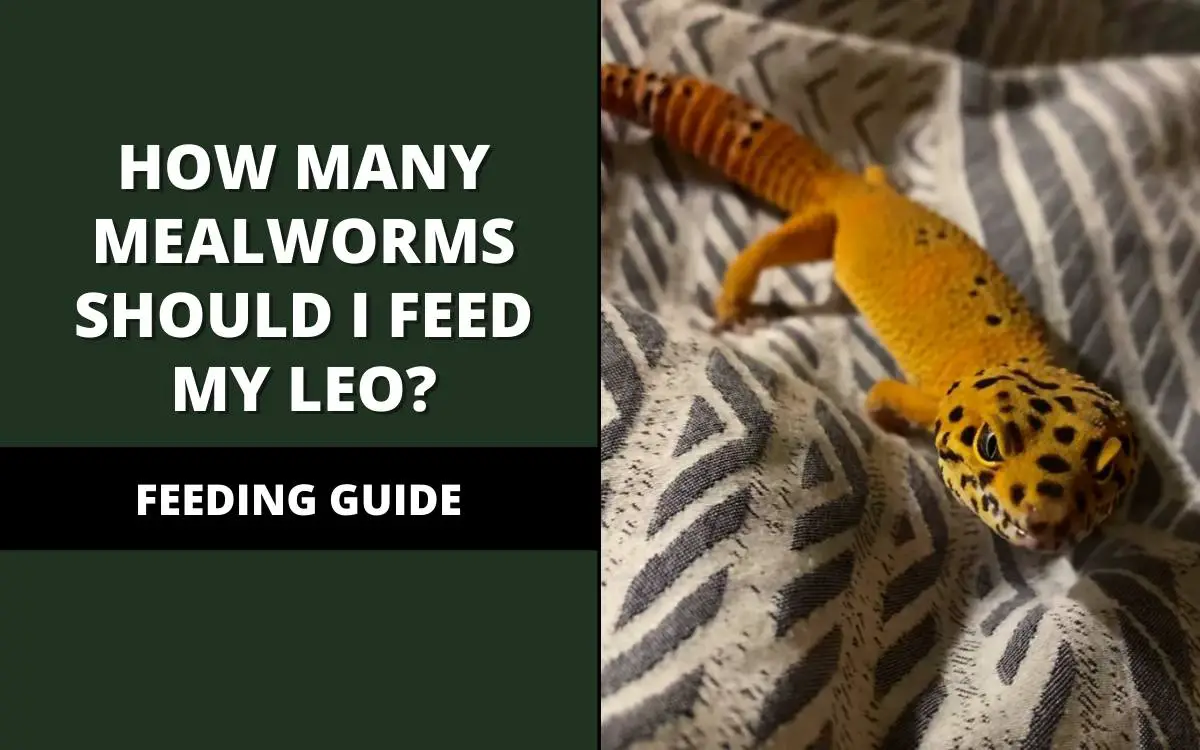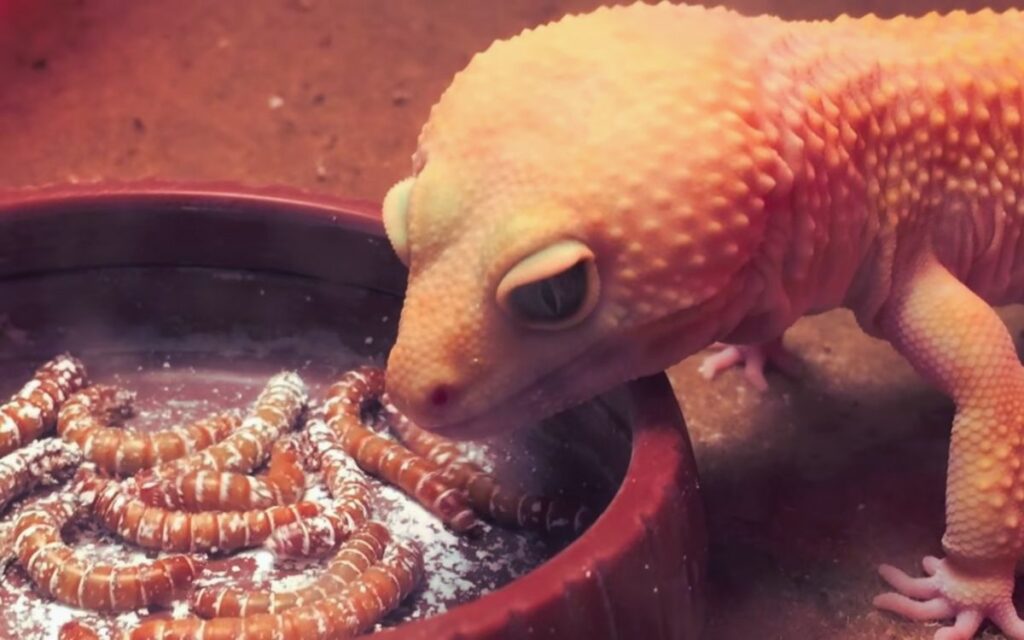Disclaimer: As an Amazon Associate I earn from qualifying purchases. Therefore, we may collect a share of sales from the links on this page, at no extra cost to you!

Mealworms are a common feeder insect for leopard geckos, and several variants are available. Owners keen to offer the right nutrition to their leopard geckos know there’s no universal feeding template for reptiles. That’s why owners of leopard geckos usually ask – How many mealworms should I feed my leopard gecko?
How many mealworms you need to feed your gecko depends on your pet’s size, appetite, and nutritional needs. As a rule of thumb, consider feeding your gecko two mealworms per inch of its overall head-to-tail length. For instance, an owner of a 5” gecko should feed their reptile ten mealworms whenever its mealtime.
Now that we’ve got that out of the way, let’s go over some other crucial diet tips as well as other bugs you can feed your leopard gecko to provide them a varied diet.
Jump to..
How Often Should I Feed My Leopard Gecko Mealworms?
Note that you should not feed your leopard geckos mealworms larger than the space between its eyes. When you’re placing an order for insects from pet stores, keep this in mind.

Baby Leopard Geckos
Feed your baby leopard geckos six to eight small-sized mealworms every day. These mealworms should increase in number until your gecko gets to about four-and-half inches in length.
Juvenile Leopard Geckos
Leopard geckos at an intermediate stage should eat around eight to ten small mealworms or five to six big worms. These worms should be no wider than the spaces between your geckos’ eyes.
Adult Leopard Geckos
Mature geckos should feed on about six to nine big-size mealworms. Make sure the mealworms your geckos eat mealworms no larger than the space between your reptiles’ eyes.
Besides Mealworms, What Else Can Leopard Geckos Eat?
Crickets
Most reptiles enjoy eating orthopterous insects like crickets, and leopard geckos consider it a staple feeder insect. You can easily place an order for a box of crickets to feed your leopard gecko. This method will save you a ton of method in the long run.
However, you don’t want them all to die off before your gecko gets to eat them. Dead crickets offer no nutrients and could carry diseases, so be sure to watch a YouTube video on taking care of crickets.
Hornworms
Leopard geckos can eat hornworms (manduca quinquemaculata) and find these white-striped, green hawk-moth larvae tasty. Most hornworms feed on tomato (tomato hornworm) or tobacco (tobacco hornworm). Hornworms can be bred at home, but several options are available to get these worms shipped to your doorstep.
Silkworm
Even if silkworms are credited as a principal source of silk, these insects are a staple for leopard geckos. Raising a silkworm colony could range from expensive to impossible based on your resources. So, your best bet is to place order for these larva from a pet shop.
Butterworms
These worms are high in fat and could get your leopard geckos obese. Feed your geckos butterworms as treat a few times per month and no more. Giving your geckos these insects as a staple meal exposes them to being overweight and lazy.
Superworms
Some superworms are raised with hormones, but are still great sources of nutrients to leopard geckos. Feed your leopard geckos these worms sparingly, maybe 2 – 4 times per month.
Sow Bugs
Feeding your leopard geckos sow bugs could provide them ample nutrients to get on with their night activity. Don’t feed your geckos too much of these bugs, though, as they could get addicted and refuse other insects.
Related Reading: Can Leopard Geckos Eat Grasshoppers?
Are Supplements Necessary for Leopard Geckos?
Calcium supplements are necessary to ensure proper nutrition from each meal you give your geckos. Make sure you coat your insects with supplements to provide ample nutrients your reptile needs. Geckos could become sick and eventually die if they’re not getting the right nutrients.
FAQs
Can I feed my leopard gecko only mealworms?
Mealworms do not have all nutrients leopard geckos need to stay healthy. Owners need to include other feeder insects to a leopard gecko’s diet to provide it well-rounded nutrition. It is important to keep feeding your leopard gecko with a wide range of nutritional foods they can digest.
Can mealworms kill a leopard gecko?
Contrary to widely publicized rumors, mealworms cannot kill a leopard gecko. Several forums have comments stating mealworms can bore through a leopard gecko’s stomach. But from all indications, mealworms are a staple insect to leopard geckos and pose no real threat to their life.
Can you overfeed a leopard gecko?
Leopard geckos can become overfed and gain much weight. Besides gaining unnecessary weight, leopard geckos could regurgitate their meals, suffer impaction, or experience movement difficulty. Geckos taking in too much food are more likely to look swollen along their abdominal area.
How do you prepare mealworms for leopard geckos?
Mealworms should be gut-loaded with a complete list of vegetables. Some owners will add food used in gut-loading crickets into the mix. Feed your leopard geckos with live mealworms as dead insects are no good to your reptiles.
Final Thoughts: How Many Mealworms Should I Feed My Leopard Gecko?
How many mealworms should I feed my leopard gecko? It depends. You can feed your leopard gecko with a template of two insects to one inch of its length described above. Leopard geckos could get essential nutrients from mealworms across all ages.
Mealworms are a regular feeder insect that many gecko owners love to offer their reptiles. Feeding two insects for every inch of your gecko should be enough for each meal. Besides offering your leopard geckos mealworms, it’s important to keep providing your reptiles a good number of nutritious insects. Geckos can eat at least half a dozen other bugs as a staple meal, so check these insects out. However, offer your leopard geckos insects high in fat like superworms and hornworms as treats only. You don’t want your gecko getting any flabby love handles.
Generally, understanding your geckos’ feeding pattern and mealtimes is essential. Your geckos will make the most of a correct nutritional template and get much-needed nourishment.
